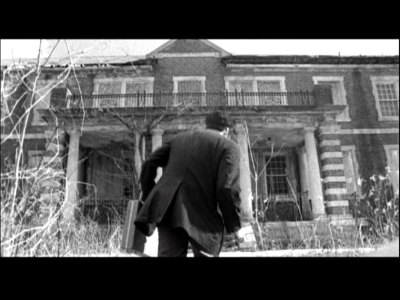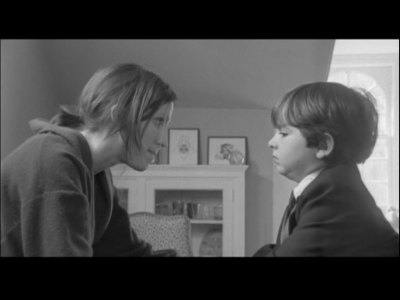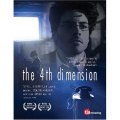| Reviews & Columns |
|
Reviews DVD TV on DVD Blu-ray 4K UHD International DVDs In Theaters Reviews by Studio Video Games Features Collector Series DVDs Easter Egg Database Interviews DVD Talk Radio Feature Articles Columns Anime Talk DVD Savant Horror DVDs The M.O.D. Squad Art House HD Talk Silent DVD
|
DVD Talk Forum |
|
|
| Resources |
|
DVD Price Search Customer Service #'s RCE Info Links |
|
Columns
|
|
|
4th Dimension, The
Wait, seriously...that's it? I mean; that's the ending? That's what I'm supposed to take away from this faux-intriguing meander? Evidently successful on the indie festival circuit, The 4th Dimension starts off nicely. And then goes on a bit. And then becomes a tad tiresome, before it perks up briefly, until finally it trots out a painfully obvious denouement that screams "film student movie!" It's not a bad film, actually. For a freshman.

The threadbare plot (I know, I know; it's not supposed to be about something as mundane as a story) concerns Jack Emitni (read his last name backwards, and you'll get an idea of the depth of the ideas here), played by Louis Morabito, who may or may not be inhabiting a dream world-slash-third and fourth dimensional existence as he time-travels back and forth between memory and frightening reality (had enough yet?). Jack, who apparently works as a craftsman at an antique shop, is shown sleeping, and making tea, and washing his hands, and stumbling around deserted, perfectly framed compositions, over and over again. Existing in flashback (or does he? hmmmm....), seven-year-old young Jack (Miles Williams) also makes tea for his sick mother (Karen Peakes), and zones out in his curiously anachronistic one-room schoolhouse before jumping up and postulating on quantum physics. Later, there are hints that perhaps Albert Einstein may have left his notes for his unfinished Unified Field Theory in a clock that Jack is mysteriously repairing, while a mystery woman threatens Jack with...sex, I guess, if he doesn't fix that very same clock. And then the end comes, explaining everything. And nothing.
Perhaps it was unfair to review The 4th Dimension so soon after I watched those marvelous models of economical storytelling in the Warner Bros. Gangsters Collection, Vol 3 boxed set. I know comparing those gems to a film like The 4th Dimension is a fruitless exercise in apples and oranges (sorry). And please don't cry, "Traditionalist!" in my direction, either. I could watch Lynch every day, a filmmaker whom the directors so obviously want to emulate. But while imitation may indeed by the sincerest form of flattery, it also usually results in familiar, cliched films that we've all seen far too many times before.
And with The 4th Dimension, it's a shame that tenet holds true here. Because I was genuinely intrigued by directors and writers Tom Mattera and David Mazzoni's initial set-up. There's an opulent steady-cam shot at the beginning of the film, right out of De Palma, that sets a suitably ominous, silky mood to The 4th Dimension, a mood that follows through for about its first thirty minutes. Abstract, enticing bits of business are thrown out about parallel universes, obsessive-compulsive behavior, sad memories of childhood loss and death, and dream-like encounters with quirky characters, until you start to think that hey, maybe this film is going to be different. Maybe there's a story here we haven't seen before.
And so we wait. And wait (if 82 minutes doesn't sound too bad, listen to the directors' commentary - they joke about the film feeling three hours long). So then we begin to concentrate on the sometimes grainy, sometimes creamy black and white cinematography and the carefully composed shots, while we wait for the film to sort itself out. And The 4th Dimension is good looking. At first. That is, until you start to realize that it looks good like all of those other film student MFA theses where each and every shot has to look like Lean crossed by Lynch crossed by Hallmark®. And then that becomes annoying. And finally it sinks in and becomes obvious that The 4th Dimension won't be going anywhere new. Or even interesting.
Films like The 4th Dimension always seem to attract a small following who see the black-and-white cinematography, the deaden, emotionally blank performances, the liberal uses of decaying, decrepit, abandoned locations (I don't blame them, those kinds of places are fun to shoot), and a deliberate attempt to obfuscate rather than illuminate or inspire or even intrigue, and immediately dredge up (usually incorrectly) the word "Kafkaesque." It's like ringing a bell for these guys. But despite its indie/alternative intentions, in its own way, The 4th Dimension is just as formulaic and generic and genre-limited as any mainstream, cookie-cutter offering. It has a prescribed set of limitations, it works within them, utilizing recognizable techniques and themes, and it satisfies those few who are looking for precisely that experience, over and over again. "Unfocused" becomes "depth," because all you have to say is, "Well, what do you think it means?" and that's the end of any potential criticism. If you don't like The 4th Dimension, it's because you're not "with its mood," or worse (in the ultimate snob/anti-snob put-down), "you just didn't get it."
MAJOR SPOILER ALERT!
Unfortunately for The 4th Dimension, though, it can't even fall back on that tried-and-true (and fatally tired) rejoinder. Because The 4th Dimension decides in the last ten minutes to spell out the film's meaning in its entirety with a frankly ridiculous and obvious explanation that's neither particularly original nor compelling. You see...Jack is crazy. He was a former mental patient, returning to the abandoned, crumbling Philadelphia State Hospital, trying to go back to his childhood home. If you wanted to believe in the possibility of all those intriguing hints of parallel universes and time travel, well, I'm afraid you're out of luck. Because the filmmakers make sure we can see Jack's paperwork from his hospital stay, spelling out his mental condition to the letter, which deteriorated for seven-year-old Jack when his mother died. And if that isn't enough to convince you that everything that has come before is prosaically banal, as the film ends and we wonder why we tried to figure out all of the flashbacks and red herrings in the first place, the directors top themselves in the "literal department" (or the "hammer to the head department") with a text coda detailing the ignominious history and ultimate fate of the real-life Philadelphia State Hospital, and how former inmates used to go back there, searching for their past lives. Jesus, Kubrick - can you give me a break? My head is spinning!
Let's be clear about The 4th Dimension. It's not a hateful film. I may find its limited, lazy aims ultimately contemptible, but the filmmakers do have talent. Perhaps it isn't for screenwriting (or at least for this kind of soap bubble), but they can create an atmosphere; they can intrigue (at least initially) - and that's tough to do. Some of the performances the directors elicited aren't too bad, either (I may have laughed out loud when heretofore blank cipher Morabito hammed it up in his final big "acting scene," but the little boy Miles Williams, and Karen Peakes, who played his mother, were quite effective together). It's just a shame that The 4th Dimension winds up to be so slight and ultimately worthless. Seeing the directors' obvious affinity for their location work at the real Philadelphia State Hospital (right before it was completely demolished in 2007), I found myself wishing they had taken the opportunity to just shoot miles and miles of film of the place to perhaps facilitate a documentary on the subject, instead of this fatally familiar psychological piffle. Unfortunately, there are far more good intentions in The 4th Dimension than actual results.

The DVD:
The Video:
The non-anamorphic, letterboxed 1.85:1 video transfer (I believe the film was shot on Super 16) is spotty in places, with pixilation noticeable in the visually busier outdoor scenes. Obviously, the smaller the monitor, the better this is going to look.
The Audio:
There's a nicely delineated 5.1 Surround stereo mix that makes good advantage of some discreet sound effects and the suitably moody score by John Avarese. There's also a perfectly acceptable 2.0 mix, as well. There are no subtitles or close-captioning options.
The Extras:
There are two full-length commentary tracks for The 4th Dimension; the first features writers/directors Dave Mazzoni and Tom Mattera, and actor Louis Morabito; the second features Mazzoni and Mattera again, and the director of photography, Daniel Watchulonis. The commentary feels more like friends getting together, goofing around, than a serious discussion of the film - and maybe that's not such a bad thing, considering this film. There are five deleted scenes included, timing out at 9:27 in total, that don't help the film in the slightest. There's a seventeen minute Making of... featurette that's certainly more interesting than the actual feature. And the original trailer is also included.
Final Thoughts:
Psycho-babble twaddle, masquerading as a quasi-enigma, wrapped up in a fatally pretentious package, and delivered in a humorless, self-involved, self-absorbed manner. In other words: it's the perfect film student movie. The directors have talent, but they need to work off other people's scripts - not their own. Skip The 4th Dimension.
Paul Mavis is an internationally published film and television historian, a member of the Online Film Critics Society, and the author of The Espionage Filmography.


|
| Popular Reviews |
| Sponsored Links |
|
|
| Sponsored Links |
|
|
| Release List | Reviews | Shop | Newsletter | Forum | DVD Giveaways | Blu-Ray | Advertise |
|
Copyright 2024 DVDTalk.com All Rights Reserved. Legal Info, Privacy Policy, Terms of Use,
Manage Preferences,
Your Privacy Choices | |||||||













